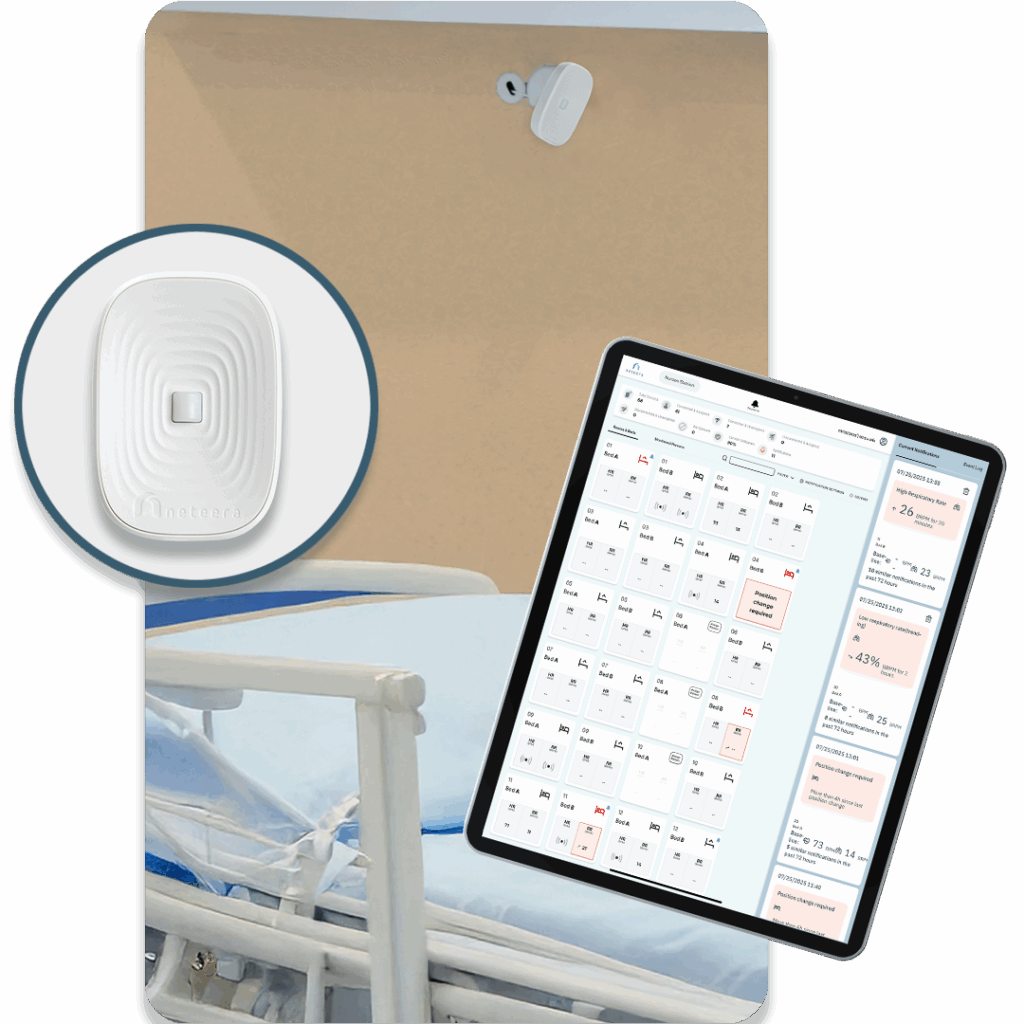Smart Monitoring
That Performs for
Healthcare
Payers
Neteera’s contactless remote patient monitoring is a valuable asset for healthcare payers seeking to improve patient outcomes and cost efficiency.
Smart Monitoring
That Performs for
Healthcare
Payers
Neteera’s contactless remote patient monitoring is a valuable asset for healthcare payers seeking to improve patient outcomes and cost efficiency.
Accountable Care Organizations • Medicare Advantage Plans
Value-Based Care • Institutional Special Needs Plan
• Accountable Care Organizations
• Medicare Advantage Plans
• Value-Based Care
• Institutional Special Needs Plan
Generate Returns and Positive Patient Outcomes
Heart
Rate
Our vital signs monitoring enables accurate heart rate tracking, aiding early detection of potential cardiac issues and promoting timely interventions.
Respiratory
Rate & Depth
The Neteera System helps clinicians monitor and analyze key respiratory parameters. Respiration rate and depth, as well as inhale/exhale ratios, provide critical insights.

Bed Exit &
Movement
Receive timely notifications when a patient leaves the bed, often within 30 seconds of exit. These alerts can reduce risk of falling or injury. Tracking bed exit frequency and duration plus mobility monitoring can help tailor care and early intervention.

Position
Changes
Customized timing aligns with your protocols and can alert when patient is still for an extended period. Your team can also use this information to prevent pressure ulcers, provide 24/7 care, and take proactive action.

Contactless connection. Extensive patient data.
• Real-time vital and activity data
• Centralized dashboard
• Smart alerts tailored for each patient
• AI-driven trend analysis
• Protects patient privacy and comfort
Contactless Remote Patient
Monitoring For Your Care Setting
ACCOUNTABLE CARE ORGANIZATIONS
- Enhance ACO performance: Align monitoring capabilities with ACO quality improvement initiatives through a metric-based approach to optimizing care.
- Elevate outcomes and quality of care: Enhance the level of care for ACO patients and support lower readmission rates and shorter hospital stays.
- Reinforce patient focus: Support a commitment to effective, empathetic patient care with touchless monitoring that can improve patient comfort, independence, and engagement.
- Improve clinical workflows: Automate the continuous measurement of vital signs to boost workflow efficiency and reduce administrative burdens.


MEDICARE ADVANTAGE PLANS
- Monitor in real time: Access continually current patient heart rate, respiratory rate, and activity data for timely care.
- Enhance care prioritization: Identify individual patient needs by utilizing continuous health data to help staff focus on where care is most needed.
- Enable virtual triage: Improve remote assessment and decision-making with critical health measurements, tailored notifications, and AI-driven insights.
- Increase care accessibility: Reduce travel requirements for clinicians and remotely monitor patients in rural and underserved areas.
- Achieve CMS Home Health Quality Measures: Elevate performance on Centers for Medicare & Medicaid Services (CMS) measures for patient ratings and Home Health Consumer Assessment of Healthcare Providers and Systems (HHCAHPS).
VALUE-BASED CARE
- Align with value-based care (VBC): Promote proactive care and improve the standard of care through integrated, continuous patient data that supports VBC models.
- Achieve quality goals: Align actionable, AI-powered patient monitoring insights with care quality objectives and metrics.
- Advance early intervention: Identify changes or trends that can guide timely intervention and proactive disease management.
- Reduce hospitalization: Detect early signs of healthcare concerns to decrease avoidable hospital admissions through continuous patient oversight.
- Drive improved outcomes: Apply proprietary algorithms to provide measurable improvement in patient healthcare outcomes and satisfaction metrics.


INSTITUTIONAL SPECIAL NEEDS PLAN
- Enhance value-based care: Strengthen value-based care initiatives under Medicare Plus for at-risk providers.
- Enable proactive treatment: Empower the shift from reactive to proactive care with data that helps identify trends and changes in a patient’s health status.
- Reduce costs: Lower costs with insights that can help with early detection and timely intervention, preventing issues from worsening.
- Provide specialized care: Enable a targeted approach to provide individualized care and support within the ISNP framework.
- Maximize effectiveness: Improve efficiency, clinical value, and utility with health data that can ease management of vulnerable patient populations.
Contactless Remote Patient
Monitoring For Your Care Setting

ACCOUNTABLE CARE ORGANIZATIONS
- Enhance ACO performance: Align monitoring capabilities with ACO quality improvement initiatives through a metric-based approach to optimizing care.
- Elevate outcomes and quality of care: Enhance the level of care for ACO patients and support lower readmission rates and shorter hospital stays.
- Reinforce patient focus: Support a commitment to effective, empathetic patient care with touchless monitoring that can improve patient comfort, independence, and engagement.
- Improve clinical workflows: Automate the continuous measurement of vital signs to boost workflow efficiency and reduce administrative burdens.

MEDICARE ADVANTAGE PLANS
- Monitor in real time: Access continually current patient heart rate, respiratory rate, and activity data for timely care.
- Enhance care prioritization: Identify individual patient needs by utilizing continuous health data to help staff focus on where care is most needed.
- Enable virtual triage: Improve remote assessment and decision-making with critical health measurements, tailored notifications, and AI-driven insights.
- Increase care accessibility: Reduce travel requirements for clinicians and remotely monitor patients in rural and underserved areas.
- Achieve CMS Home Health Quality Measures: Elevate performance on Centers for Medicare & Medicaid Services (CMS) measures for patient ratings and Home Health Consumer Assessment of Healthcare Providers and Systems (HHCAHPS).

VALUE-BASED CARE
- Align with value-based care (VBC): Promote proactive care and improve the standard of care through integrated, continuous patient data that supports VBC models.
- Achieve quality goals: Align actionable, AI-powered patient monitoring insights with care quality objectives and metrics.
- Advance early intervention: Identify changes or trends that can guide timely intervention and proactive disease management.
- Reduce hospitalization: Detect early signs of healthcare concerns to decrease avoidable hospital admissions through continuous patient oversight.
- Drive improved outcomes: Apply proprietary algorithms to provide measurable improvement in patient healthcare outcomes and satisfaction metrics.

INSTITUTIONAL SPECIAL NEEDS PLAN
- Enhance value-based care: Strengthen value-based care initiatives under Medicare Plus for at-risk providers.
- Enable proactive treatment: Empower the shift from reactive to proactive care with data that helps identify trends and changes in a patient’s health status.
- Reduce costs: Lower costs with insights that can help with early detection and timely intervention, preventing issues from worsening.
- Provide specialized care: Enable a targeted approach to provide individualized care and support within the ISNP framework.
- Maximize effectiveness: Improve efficiency, clinical value, and utility with health data that can ease management of vulnerable patient populations.
Ready to transform
patient monitoring in your organization?
Take the next step and request a demo today.


